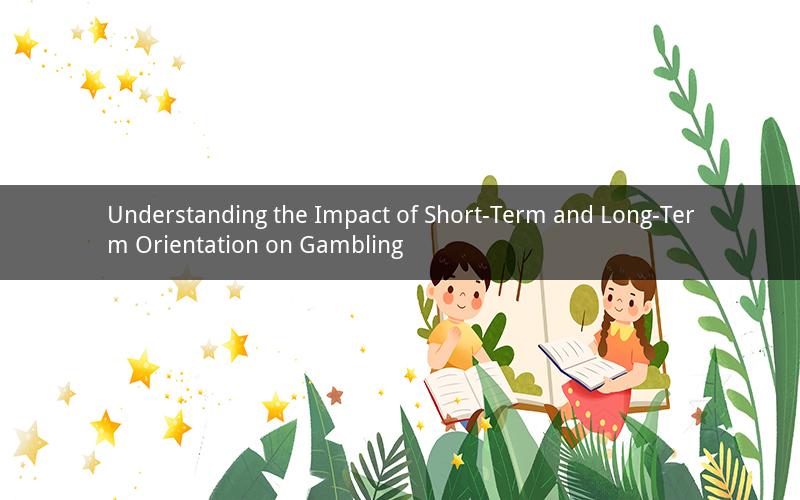
In the realm of gambling, individuals often exhibit different orientations towards their betting habits. This article delves into the concept of short-term and long-term orientation in gambling, exploring their implications and effects on individuals. By examining the characteristics and consequences of each orientation, we aim to provide a comprehensive understanding of how these orientations shape the gambling experience.
Short-term orientation in gambling refers to the approach where individuals focus on immediate gains and entertainment. They are more likely to engage in impulsive betting, chasing losses, and seeking quick profits. On the other hand, long-term orientation involves a strategic and disciplined approach, aiming for sustainable success and responsible gambling practices.
1. Characteristics of Short-Term Orientation in Gambling
a. Impulsive Betting: Individuals with a short-term orientation often make decisions based on emotions rather than logic. They may place bets impulsively without considering the odds or potential consequences.
b. Chasing Losses: When facing losses, individuals with a short-term orientation tend to chase their losses, hoping to recover the money they have lost. This behavior can lead to even greater financial and emotional damage.
c. Quick Profits: Short-term gamblers prioritize quick wins, often focusing on games with high volatility and high-risk elements. They seek immediate satisfaction and gratification.
2. Characteristics of Long-Term Orientation in Gambling
a. Strategic Approach: Individuals with a long-term orientation in gambling tend to develop a strategic plan. They analyze the odds, choose games with a lower house edge, and set realistic goals.
b. Responsible Gambling: Long-term gamblers prioritize responsible gambling practices. They set budgets, monitor their spending, and avoid chasing losses. They understand the importance of balancing gambling with other aspects of life.
c. Patience and Discipline: Long-term gamblers exhibit patience and discipline. They understand that gambling is a form of entertainment and not a guaranteed source of income. They avoid impulsive decisions and focus on sustainable success.
3. Implications of Short-Term Orientation in Gambling
a. Financial Loss: Short-term gamblers are more prone to financial loss due to impulsive betting and chasing losses. They may end up spending more money than they can afford and accumulating debt.
b. Emotional and Psychological Impact: The constant pursuit of quick wins and the inability to accept losses can lead to emotional and psychological distress. Individuals may experience anxiety, depression, and addiction-related issues.
4. Implications of Long-Term Orientation in Gambling
a. Sustainable Success: Long-term gamblers are more likely to achieve sustainable success due to their strategic approach and responsible gambling practices. They focus on long-term gains rather than immediate gratification.
b. Improved Quality of Life: By prioritizing responsible gambling, long-term gamblers can maintain a healthy balance between gambling and other aspects of their lives. This can lead to an improved overall quality of life.
c. Reduced Risk of Addiction: The disciplined and strategic approach of long-term gamblers reduces the risk of developing gambling addiction. They are more aware of the potential dangers and take necessary precautions.
5. Related Questions and Answers
Question 1: What are the signs of a short-term orientation in gambling?
Answer: Signs of a short-term orientation in gambling include impulsive betting, chasing losses, and a focus on quick wins.
Question 2: How can a long-term orientation in gambling benefit an individual?
Answer: A long-term orientation in gambling can lead to sustainable success, improved emotional well-being, and a reduced risk of addiction.
Question 3: What are some strategies to develop a long-term orientation in gambling?
Answer: Strategies to develop a long-term orientation in gambling include setting budgets, analyzing odds, choosing games with a lower house edge, and maintaining a balanced approach to gambling.
Question 4: Can a short-term orientation in gambling lead to addiction?
Answer: Yes, a short-term orientation in gambling, characterized by impulsive behavior and chasing losses, can increase the risk of developing gambling addiction.
Question 5: How can individuals overcome a short-term orientation in gambling?
Answer: Individuals can overcome a short-term orientation in gambling by adopting responsible gambling practices, seeking support from professionals, and focusing on long-term success rather than immediate gains.